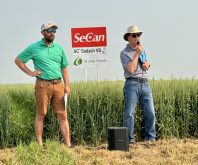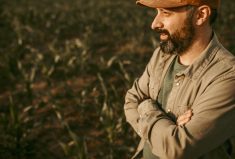To say that Marty and Krista De Groot have their hands full is an understatement. The young couple are in the midst of taking over the third-generation family farm from Marty’s parents. Although his dad, Jack, still helps out, Marty does the bulk of the daily work, taking care of the 40,000 broiler chickens, 2,500 nursery pigs and 450 acres of cash crops as well as the book work on the farm near Stratford, Ont.
Krista, although she’d love nothing better than to be out driving the combine, has temporarily relinquished the combine driving to Marty’s mom, Francine, while she takes care of newborn son, Jacob, five-year-old daughter, Adelle and son, John, who is almost two.
Read Also

Youth motivated to find answers to today’s agricultural challenges
This is the first in a series of articles exploring the perspectives and experiences of young people who are finding…
In the midst of it all, however, the De Groots still found time to take the Advanced Farm Management (AFM) program this past winter, offered by the Agri-Food Management Institute of Guelph.
Importantly, too, they found a way to take the course as a couple.
All the planning worth it
The De Groots admit it took more than a little planning to find a way to clear the time for both of them to attend the five-day course — one day in December followed by more sessions in January and February.
“It took us three years to get there after we first started talking about the course,” Krista acknowledges. The first year, they’d only heard about the program a few days before the application deadline, and the next year they had a newborn to look after. “But last winter I was pregnant, so we took the opportunity to go. Marty’s parents were great because they knew this would benefit them too, so they took care of the kids while we were gone.”
Whatever it took to get there, the couple decided the course was something they needed to do.
“For us it was a good chance to actually think about our business a little bit more,” says Krista. “We got married and had a baby right away, and I was working and we never had taken the time to look at our financials and think about our vision and do all those things we knew were important but hadn’t prioritized.
“It really made us get on the same page about what we wanted for our future and for the business.”
Marty (35) and Krista (36) both grew up in the Stratford area and attended the University of Guelph, taking agricultural degrees. Marty came back to the farm in 2004 after a few years away working in trades and also for other farmers to gain some different skills.
By 2005, he had decided he wanted to stay and became a partner in the farm with his parents. At the time, the farm raised about 300 sows farrow to finish, but by 2008, with pig prices not great, and with new housing on the horizon and older barns that would soon have to be renovated or replaced, Marty and his dad decided to make a switch and Marty purchased broiler chicken quota.
Today, they are in the process of transitioning the farm, so it was an opportune time to get some additional training.
Although AFM didn’t specifically cover the succession process, it gave them some additional tools to help it along, and equally importantly, acted as a catalyst to strengthen communication between all the family members.
“It’s helping us with succession planning by defining our vision, our plans and what we want for the future, talking and writing down our priorities for the business,” says Krista. “Then knowing what questions to ask so we don’t get into succession planning and find some skeletons in the closet or something that one person didn’t know. We’ve asked Marty’s parents too about what role they see for themselves in the future and then defined the things that they need as they spend more time in retirement. It’s been good for all of us to have those conversations.”
More and more farm couples taking training
Educators report a definite trend toward farm couples and different combinations of farm partners taking advanced management courses together.
The De Groots first heard about AME from another farm couple who had taken it, and their group included a father and daughter team. “There were quite a few of us that were in that same place of transitioning the farm, so although it wasn’t a specific topic covered, it came up a lot in conversations with the rest of the group,” says Krista.
Having more than one person also means they will get different things out of a course like AFM. Marty and Krista were naturally attracted to some components that interested them more and which they feel will have tremendous value for their business.
Krista, who worked in marketing and communications for almost 10 years, found a lot of value in sessions about branding the business. “I never really knew how to apply it to the farm or if it mattered,” she says. “It’s different for every operation but branding is so important because it affects your reputation in the community and the industry. A nice sign up with our farm name or some coats with our farm name on them, things like that all say something good about your operation. It was great to be able to take this course with Marty so he could understand too why your family brand and your business brand matters.”
The farm has no employees, so Marty has always looked for ways to improve efficiency wherever he can, from installing a large, continuous flow dryer that cut drying time by several weeks, to upgrading the sprayer and corn planter to save him time at planting. So it wasn’t surprising that he was intrigued by sessions about LEAN — a concept that began in the manufacturing sector and is designed to eliminate waste and make processes more efficient.
“A dairy producer spoke about how he had used the principles of LEAN to save him a lot of milking time. He basically compared how long it took to milk each cow and then batched the slower and faster milkers together, which ended up being more efficient,” says Marty. “It really prompted me to question why and how we do things and to think about how I could make things I do every day more efficient.
“One of the first things I did when I came home was cut the cleaning time for our 800 feed pans from four hours to an hour-and-a-half just by changing the process a little bit.”
Improved financial skills a major goal
When it came to the financial aspects of the training, the couple were completely onside. A major goal for each was to better understand the farm financials, and it’s paid off because now they are much more comfortable having conversations with their banker.
“Marty sat down and did all of our financial ratios, and he went back six years through our financial statements and put everything into a spreadsheet so we could actually track it,” says Krista. “We’ve taken that to our banker and talked about what they’re looking for in ratios, what ours are, where we need to improve, and which ones are good. We know what our banker is looking for before they can lend us money and we know what we need to work on, so that’s been really helpful to help us all be on the same page.”

Being more confident with the numbers means it’s easier to show his parents the return on investment for purchases and to make the right equipment decisions, says Marty. When they bought a new sprayer last year they knew it was saving them time and money because they’d calculated the total costs of having to bring in a custom sprayer, as they’d had to do previously.
“Knowing the numbers better, I was able to show Mom and Dad that it does cash flow,” says Marty. “We have figured our new sprayer is going to be paid for in five years just from savings on the custom work and the time savings. It used to take us six hours to spray our corn ground and now that’s down to three hours. Every time we go to the field now, it’s saving $10 an acre, which we can put back towards the loan. And we’re saving on nitrogen costs by storing it, so there’s another premium there too.”
Taking care of today so they can grow tomorrow
Marty and Krista want to continue to expand the farm business, maybe adding employees at some stage when their parents finally retire completely, and building a second chicken barn or even purchasing some more land over the next decade or so. “It will depend on the growth of the industry, but for the time being we are looking at everything that makes us money right now and seeing if we can tweak everything,” says Marty.
Krista and Marty are glad they took additional training together because it forced them to have the conversations they hadn’t gotten around to having.
“Just doing the homework and talking it out and being open with each other and asking why do we do things this way, saying ‘it drives me crazy when this happens’ and ‘why does that happen?’” says Krista.
“Being able to have those conversations, to know what’s going on and be on the same page so that you can go forward together… Most farms are multi-million-dollar businesses and you need to keep your marriage, family and business intact, so you have to be able to share all those things together.”
Their advice for other couples who might be thinking of taking some advanced management training is to go in the winter, go together, and make it a priority.
Says Krista: “Life’s just going to get busier, so do it as early as possible when you’re taking over a farm or business.”
















